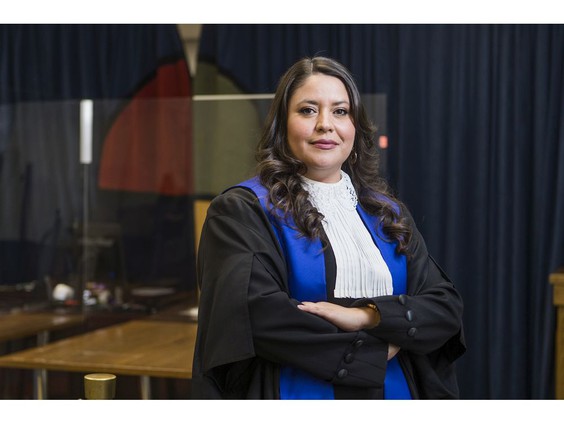
Judge Lua Gibb, an Onion Lake Cree Nation success story
"Lua is the epitome of what our ancestors prayed for — an educated Cree person who helps their people and who will carry on the Cree culture and traditions."
By Bre McAdam • Saskatoon StarPhoenixLua Gibb (LLB'05) says she knew she wanted to be a lawyer when she was four years old.
Twenty years later, she was one.
Then, following the explosive reaction to the 2018 verdict in the Gerald Stanley murder trial, Gibb applied to become a provincial court judge in Saskatoon.
“I felt this call to respond to the need in the community that access to justice included the visibility of Indigenous people in roles in the court as judges, as lawyers,” says Gibb, a member of the Onion Lake Cree Nation, in an interview with the Saskatoon Star Phoenix.
She applied, but didn’t dwell on it, comforted by the fact that she loved the work she was doing as a federal Crown prosecutor in Saskatoon.
That made her appointment in January that much more of a happy surprise.
Almost a year later, in an empty courtroom with a medicine wheel used for sentencing circles woven into the carpet, Gibb said she strives to be the kind of judge who really sees the people who come before her — bringing a lived experience that is critical to understanding their challenges.
Gibb is a proud Cree woman. She is also an intergenerational residential school survivor: Her mother attended residential school in Onion Lake from Kindergarten until the age of 14. Her family has experienced violence, poverty, transiency: all the critical components the Supreme Court of Canada addressed in the Gladue decision, and then affirmed in the Ipeelee decision.
Those same traumas affect many offenders and victims who appear in the courtrooms over which Gibb now presides.
****
A Google search for “Onion Lake Cree Nation” — a large reserve straddling the Alberta-Saskatchewan border — yields stories of gang violence, drug trafficking and states of emergency flooding the screen.
It bothers Gibb. She believes there is a direct correlation between the community’s challenges and its residential school history — what she calls “the contemporary manifestation of historical harms.”
“It’s those types of issues that are being profiled and amplified when I think it can be contrasted by many band members who are doing incredible things in the community and are contributing, in a meaningful way, to improving outcomes.”
Her roots may be in Saskatoon, but she describes a deep connection to the poplar bluffs and Indigenous plants that surround Onion Lake, where most of her relatives still live. She comes from a strong matriarchal family, filled with what she calls “auntie energy.”
Gibb moved around a lot as a child. She attended 15 different schools before settling in Saskatoon, graduating from Aden Bowman Collegiate and then the University of Saskatchewan’s law program.
She says she would tell her friends, teachers — anyone who would listen — that she was going to be a lawyer. Advocacy was in her veins.
“I was struck at a young age with this inherent sense of justice. I wanted to work toward improving justice in our communities and addressing inequities,” she says.
Read the full article at https://thestarphoenix.com.

